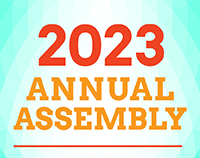
Assembly Highlight - Drainage Percutaneous Endoscopic Gastrostomy for Malignant Bowel Obstruction in Advanced Cancer: Patient Expectations and Decisional Regret
*This recording is repurposed from the 2023 Annual Assembly
Decompressive percutaneous endoscopic gastrostomy (dPEG) is often recommended for palliation of symptoms in patients with malignant bowel obstruction. While this intervention can help improve comfort, patients may have unrealistic expectations about their ability to resume eating, enhance nutritional status, build strength, and receive further disease-directed treatment. We undertook this study to evaluate patients’ expectations about the impact of dPEG placement. We prospectively enrolled 50 adult patients in our dedicated cancer hospital who were scheduled for dPEG for management of MBO between 9/2019-2/2022. Before the procedure, patients completed the FACT-G7, a closed-ended questionnaire about expected outcomes of the procedure, and a brief, semi-structured qualitative interview exploring their understanding of the procedure and expectations for the future. Two weeks after the procedure, patients were contacted to complete the FACT-G7 for a second time and Decision Regret Scale. Sociodemographic, clinical variables, and patient outcomes were collected. The most common primary tumors in this cohort were ovarian (28%), pancreatic (24%), and colon (14%), and the median time to death after dPEG was 30 days (range 5-780). Before the procedure, almost half of patients had unrealistic expectations about the potential benefits of dPEG on their ability to eat and to prolong their life and cited these expected benefits as important in their decision to undergo the procedure. At follow-up, one third of patients expressed regret about the decision. However, patients reported improvement in symptom burden after the procedure compared to before. Our findings suggest ongoing needs to improve communication to help align patients’ expectations with their future experience and support them to manage challenges.
Target Audience
Hospice Medical Directors
HPM Physicians
Nurses
Nurse Practitioners
Pharmacists
PAs
Learning Outcomes
1. Describe the potential benefits of dPEG in patients with a malignant bowel obstruction
2. Evaluate the importance of effective communication regarding dEPG in patients with advanced cancer
Disclosures
AAHPM endorses the Accreditation Council for Continuing Medical Education (ACCME) Standards for disclosure and commercial support and endeavors to ensure balance, independence, objectivity, and scientific rigor for all accredited products or programs. All who are in a position to control or influence the content of an educational activity must disclose any relevant financial relationships with ineligible companies.*Disclosure documents were reviewed for potential conflicts of interest and, if identified, were resolved prior to confirmation of participation. Only those who had no conflict of interest or who agreed to an identified resolution process prior to their participation were involved in this activity.
All editors, faculty and staff have disclosed no relevant financial relationships.
*An ineligible company is defined as any entity producing, marketing, reselling, or distributing healthcare goods or services consumed by, or used on, patients.
Faculty
Jessica Goldberg, PhD NP-BC - Lead Faculty
Richard S. Sheppard, MD
Afshana Hoque, BA
Rushil V. Patel, MD
Judith Nelson, MD JD
Staff
Leah Farfan, BA
Julie Tanner, BSN RN-BC CHPN
Angie Tryfonopoulos, BS
Theresa Nissen, BA
Laura Witt, MS-HSM
Julie Bruno, MSW LCSW
This recorded activity is a non-accredited learning resource. No CME or MOC is offered with this activity.

 Facebook
Facebook X
X LinkedIn
LinkedIn Forward
Forward